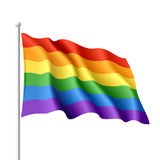If you move into certain neighborhoods, apartment complexes, or condos, you may find that you have to abide by a number of rules and regulations set down by the neighborhood homeowners association. In many cases, these are fairly simple—keep your yard in good condition, don’t put up an ugly metal carport, and don’t leave piles of garbage on the porch, try to always have some garbage bins for easy garbage hauling.
 But some LGBT residents have had issues with homeowners associations. The most recent incident has occurred in Australia, but that doesn’t mean it couldn’t happen in the U.S. or anywhere around the world where homeowners associations exist. The two elderly men were told that they had to remove their rainbow flag from the terrace of their apartment by the association because it violated the homeowners association regulations. It was, they were told, in violation of the rules that say that the external appearance of all units in the complex must be uniform in nature—curtains, blinds, and all window fixtures need to appear very similar, and the rainbow flag stood out. They also said that the rainbow flag was a type of advertising material that broke the rules.
But some LGBT residents have had issues with homeowners associations. The most recent incident has occurred in Australia, but that doesn’t mean it couldn’t happen in the U.S. or anywhere around the world where homeowners associations exist. The two elderly men were told that they had to remove their rainbow flag from the terrace of their apartment by the association because it violated the homeowners association regulations. It was, they were told, in violation of the rules that say that the external appearance of all units in the complex must be uniform in nature—curtains, blinds, and all window fixtures need to appear very similar, and the rainbow flag stood out. They also said that the rainbow flag was a type of advertising material that broke the rules.
This is just one example of LGBT people and homeowners associations butting heads. Others have been told to remove the rainbow flags from their homes, although that is becoming more and more rare. Others have found that they were discriminated against when they tried to run for the homeowners board of directors.
In some instances, you really need to read the homeowners association rules before moving into a neighborhood. For example, a homeowners association can legally ban homeowners from flying flags, but it has to be a uniform ban—they can’t deny rainbow flags specifically, but they can ban all flags that are not protected by federal law (such as the U.S. flag). They can also put restrictions on when flags are flown and even ban any flag that is so large it blocks other people’s views or is a danger to others.
Despite all of this, homeowners associations can also work for LGBT residents. Many go out of their way to help protect LGBT homeowners rights and access to housing, while others work to keep hate speech and vandalism out of the neighborhood. LGBT residents also face much less resistance to running for the association board of directors and are often very active in the community. While some do see homeowners association rules as being restrictive, many are there to keep the neighborhood looking good, which of course will raise property values and, if you ever sell your home, can lead to higher selling prices.
